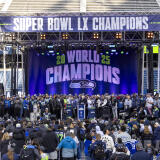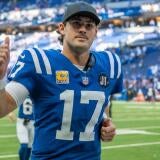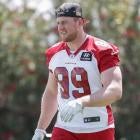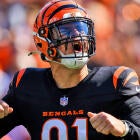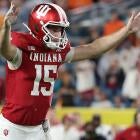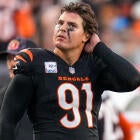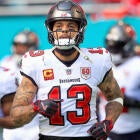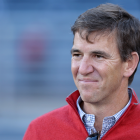NFL preview 2021: Matthew Stafford, J.J. Watt, Julio Jones among high-impact familiar faces in new places
These players should help their respective teams contend for the playoffs

Tom Brady led the Tampa Bay Buccaneers to a Super Bowl victory in his first season with the franchise. It is unrealistic to expect that level of return annually, but several newcomers should help their respective teams factor into the playoff picture.
Here are the familiar faces in new places slated to make an impact:
The QBs: Carson Wentz (Colts), Matthew Stafford (L.A. Rams) and Ryan Fitzpatrick (Washington)
For the time being, the quarterback carousel has stopped spinning and a handful are expected to start for new teams in Week 1. Rather than highlighting them all, let's focus on those most likely to factor into the playoff hunt this season.
Wentz struggled to stay healthy in Philadelphia, and his early tenure in Indianapolis has certainly not done anything to quell those murmurs. It sounds as though the former No. 2 overall selection will start for the Colts this weekend, but a greater impact can be made on the season as a whole. General manager Chris Ballard has constructed a playoff-caliber roster and laid the fate of those players at the feet of Wentz. Wentz has corralled supporters dating back to his near-MVP season, but his career resembles a banana; awful during his first and most-recent seasons (unless you're a psycho) but appealing on the inside. Fortunately, he found the most success with Frank Reich.
In Los Angeles, Sean McVay has diverted from an offense designed to administer death by a thousand paper cuts to a potent, Stafford-led air attack featuring Robert Woods, Cooper Kupp, Van Jefferson and DeSean Jackson. Reports out of Los Angeles suggest the Rams are pushing the ball downfield, and that will open the rest of the field for tight end Tyler Higbee and Kupp.
Stafford had averaged just 6.6 wins per season since joining Detroit, and it has been five years since he appeared in the playoffs. The expectations that come with his arrival in Los Angeles should be welcomed.
People are overlooking the historic lack of success among 38-year-old quarterbacks in the NFL. Recent history has clouded judgment with Tom Brady being the outlier, not an example. Washington has a strong roster that should compete for a playoff spot, but it is very dependent upon the health and success of Fitzpatrick. He could have a huge impact and lead Washington to an NFC East crown, but there is a higher level of risk.
Sam Darnold (Panthers), Teddy Bridgewater (Broncos), Jared Goff (Lions) and Andy Dalton (Bears) are a few of the other quarterbacks starting for a new team this season.
Patriots TEs Hunter Henry and Jonnu Smith
There are examples of teams every year that have no identity, but a Bill Belichick team is easily identifiable. He wants big bodies that are going to bash opponents up front. He wants a quarterback to take care of the football and a strong ground game to deliver a victory. It is clear that he has been chasing the success he had with Aaron Hernandez and Rob Gronkowski. Belichick had been doing his shopping in thrift stores but decided to splurge this offseason and visit Rodeo Drive.
With a dearth of wide receivers, the team will lean on a presumably formidable rushing attack as well as their two tight end sets. Henry and Smith are giant safety nets for rookie quarterback Mac Jones. A year ago, Cleveland was mocked for making Austin Hooper the league's highest-paid tight end in terms of average annual value. Since then, five tight ends have surpassed that figure, and two will be catching passes in Foxboro this fall.
Patrick Mahomes's OL: Joe Thuney and Orlando Brown
Kansas City had an accomplished tackle duo of Eric Fisher and Mitchell Schwartz but the cobbled interior underperformed. Fisher and Schwartz were released this offseason, and that ushered in a new age for the Chiefs offensive line. Brown (left tackle) was brought in via trade, and Thuney (guard) was signed to a market-setting deal in free agency. The team also added center Creed Humphrey and right guard Trey Smith via the draft while welcoming back injured right tackle Lucas Niang. It is an entirely new group, and moderate health would be an upgrade over what they experienced last season.
Over the past three seasons, the Chiefs have asked Mahomes to do a lot of the heavy lifting. The current version of the offensive line should be improved if allowed time to develop together.
Cardinals DE J.J. Watt
Watt has missed 32 games over the past five seasons, and for that reason, many perceive that he has lost a step. Although true, the decline is exaggerated. Watt is still an impact player when healthy. He has lost a little juice on the edge but can still lean on his overall strength and presents mismatch opportunities when he condenses inside. The 32-year-old is just three years removed from a season in which he recorded 16 sacks. The key is that the success of Arizona's pass rush does not fall entirely on Watt's shoulders. They also have Chandler Jones and an assortment of other capable players.
Justin Herbert's OL: Corey Linsley, Matt Feiler and Oday Aboushi
The Los Angeles offensive line has been completely re-modeled over a two-year span. It began with Bryan Bulaga a year ago and sprouted into the additions of Rashawn Slater, Feiler, Linsley and Aboushi. The average NFL fan is familiar with Linsley, but Feiler and Aboushi are a bit more unheralded. Feiler showed his versatility over the course of six seasons in Pittsburgh. Aboushi is a solid journeyman. General manager Tom Telesco has turned a poor unit into a potential top 10 group. The biggest beneficiaries are Herbert and running back Austin Ekeler.
It is reasonable to expect Herbert's statistics to regress from last season, but the offensive line improvements work in his favor.
Jets WR Corey Davis
Davis has been a reliable outlet for rookie quarterback Zach Wilson. It was important for Wilson to build some trust with at least one receiving option, and injuries to Elijah Moore and Jamison Crowder rendered that challenging. Davis is not the model for an alpha receiver in the NFL, but he does not have to be this season. New York's expectations are modest, and his contributions to Wilson are invaluable. Fantasy owners should reap the rewards of general manager Joe Douglas' free agency foray.
Titans WR Julio Jones
Corey Davis moving on created a void in the Titans wide receiver room. Davis will cost the Jets less than Jones will cost the Titans over the next two seasons. Plus, Tennessee surrendered a second-round pick for the right to acquire the veteran. All considered, it was a curious decision. Nonetheless, both players are poised to have big seasons in their new digs. Jones is an athletic specimen that could have conceivably been developed in a laboratory. If he is able to stay healthy, the combination of A.J. Brown and Jones could be special.
Browns S John Johnson
Johnson comes from a successful defense with a respected coach in Los Angeles. He brings that experience over to Cleveland, where a lack of health in the secondary was exposed by the Chiefs in the playoffs. The Browns have dramatically upgraded the secondary with the additions of Troy Hill, Greg Newsome II and Johnson. A true test comes quickly with a rematch against the Chiefs scheduled for Week 1. Johnson has also been a vocal leader since arriving in the AFC North.
49ers C Alex Mack
Mack would likely not have made this list if he had gone to any other team, but his partnership with Kyle Shanahan is well-documented. Cleveland had established a league-leading rushing attack until Mack suffered a broken leg in 2014. Atlanta found a lot of success on the ground as well. The California product will step into a familiar situation alongside a few other highly-regarded linemen. Mack is savvy and should elevate the play of those around him.
Broncos CB Kyle Fuller
Chicago's poor financial choices led to Denver's gain this offseason. Fuller was a cap casualty because the team could not feasibly afford to pay him. His surprise departure from the Windy City offered the chance to reunite with former defensive coordinator Vic Fangio. The Broncos are unabashedly infatuated with their defensive line talent, and combined with Bradley Chubb, Justin Simmons, a hopefully healthy Von Miller and others, Denver should have a top defensive unit.
Colts LT Eric Fisher
The door is open for the former No. 1 overall selection to start in Week 1 against the Seahawks after sustaining an Achilles injury that prematurely ended his season in January. Indianapolis has a very talented roster, so the loss of Anthony Castonzo could have been devastating to their ultimate goal of competing for a Super Bowl. The availability of Fisher was a stroke of good fortune, especially given the health of Wentz. Fisher graded well when healthy last season, and he should serve as a cog in that machine.
Washington CB William Jackson
By now, you are aware that Washington will field one of the best defensive fronts in football this season. They are equipped to rush the passer from the edge and the interior. The investment in Jackson was a little steep but could pay dividends. Rushed decisions from the opposing quarterback inherently means more opportunities for those in the secondary to make plays. The former first-round pick has never recorded more than one interception in a single season, but his best opportunity awaits.
Others of note: OT Charles Leno (Washington), CB Steven Nelson (Eagles), OT Riley Reiff (Bengals), WR Curtis Samuel (Washington), DS Anthony Harris (Eagles), QB Jared Goff (Lions), QB Teddy Bridgewater (Broncos), LB Joe Schobert (Steelers), TE Chris Herndon (Vikings), OT Riley Reiff (Bengals), DE Jadeveon Clowney (Browns), WR Marvin Jones (Jaguars), WR Emmanuel Sanders (Bills), WR Sammy Watkins (Ravens), OG Gabe Jackson (Seahawks), TE Gerald Everett (Seahawks), DE Bud Dupree (Titans), DE Yannick Ngakoue, CB Adoree Jackson (Giants), OT Trent Brown (Patriots), OG Rodney Hudson (Seahawks)





